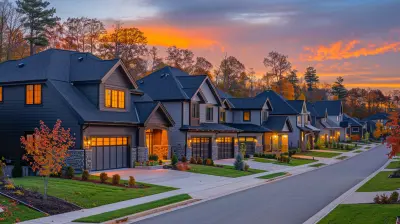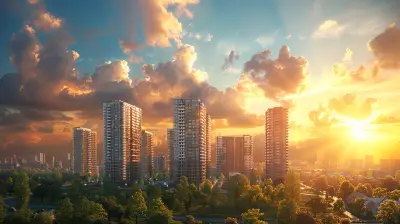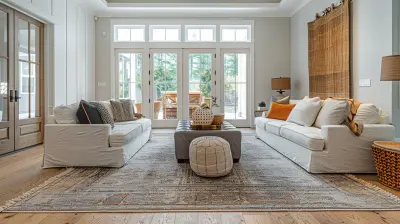How Downsizing Can Help You Reduce Your Carbon Footprint
24 July 2025
Let’s be real—most of us have too much stuff. That garage you swore would house your car? Yeah, it's now a graveyard of forgotten gym equipment and questionable holiday decorations. And that massive house with three unused guest rooms? It’s eating up energy like a teenager raiding the fridge.
Downsizing, my friend, is the secret sauce to simplifying life, saving money, and (bonus!) shrinking your carbon footprint. So, if you're looking for a fresh start—or just an excuse to finally toss that treadmill you only use as a coat rack—let’s dive into how downsizing can actually help the planet.

The Bigger the House, the Bigger the Footprint
You don’t need to be a scientist to figure this out: the bigger your home, the more energy it takes to maintain. Heating, cooling, and lighting a 4,000-square-foot house versus an 800-square-foot apartment? That’s like the energy difference between a gas-guzzling SUV and a sleek, efficient electric car.Energy Consumption: Your Home’s Sneaky Secret
A large house guzzles electricity and gas just to keep things livable. Think about all those extra rooms you barely step foot in. Even if you don’t use them daily, they’re still soaking up energy for ventilation, insulation, and temperature control.When you downsize, you use fewer resources—less water, less electricity, and, yes, even less of your precious weekend spent cleaning. Win-win, right?

Less Space, Fewer Things = Minimalist Magic
Admit it: you’ve got stuff you don’t need. Maybe you bought an air fryer because TikTok told you it was life-changing (only to use it twice). Or perhaps your closet is harboring clothes you swore you’d wear someday—but that day never came.Stuff Accumulates Like Dust Bunnies
Living in a big house often means accumulating more junk. Why? Because you have the space for it! But when you move into a smaller place, you’re forced to prioritize. Less space means fewer impulse purchases, less waste, and a more intentional lifestyle. In other words, downsizing keeps you from turning into a real-life episode of Hoarders.Decluttering = Lower Carbon Footprint
The more we buy, the more we contribute to manufacturing emissions, packaging waste, and transportation pollution. Downsizing forces you to rethink consumption habits, cutting back on unnecessary purchases that add to your carbon footprint.
Smaller Homes, Smarter Design
One of the biggest perks of downsizing is that small homes are often designed with efficiency in mind.Tiny Homes & Energy Savings
Many smaller homes today are built using eco-friendly materials, better insulation, and renewable energy sources like solar panels. It’s like Mother Nature personally high-fived the architects who designed them.Apartment Living = Shared Resources
If you move from a large house to an apartment or condo, you instantly cut down your energy consumption. Shared walls mean less heat loss (yay, lower heating bills!), and buildings often have better insulation than standalone houses.
Less Lawn, More Life
Raise your hand if you’ve ever spent a Saturday battling a lawn mower like it’s a raging beast.Downsizing often means ditching that massive yard in favor of a smaller, more manageable space—or no yard at all. And guess what? Lawns are an environmental nightmare!
Water Waste
Large lawns guzzle absurd amounts of water—especially in areas where grass isn’t even supposed to grow (looking at you, Arizona). Downsizing to a smaller yard or an apartment eliminates the need for excessive watering.Bye-Bye, Harmful Chemicals
Fertilizers, pesticides, herbicides—your lawn probably sees more chemicals than a science lab. These can wash into local waterways, harming wildlife and drinking water. Less yard means fewer chemicals, and that’s a big win for the environment.Transportation: Location Matters
Let’s talk about gas-guzzling commutes.When people downsize, they often move into more walkable communities, closer to work, grocery stores, and public transit. This means less time stuck in traffic cursing at slow drivers and fewer emissions polluting the air.
Walkability = Less Driving
Living in an urban setting or near public transit makes it easier to ditch the car in favor of walking, biking, or hopping on the bus. Not only does this reduce your carbon footprint, but it also gives you a built-in excuse to skip the gym (because lugging groceries home totally counts as a workout).
Financial & Environmental Wins
Let’s talk about the real reason downsizing is becoming so popular—it saves you serious cash.Lower Utility Bills
Smaller spaces mean less energy use, which means lower utility bills. Who doesn’t want to save money while also saving the planet? That’s like getting free guac on your burrito—it just makes life better.Fewer Maintenance Costs
A smaller home means fewer repairs, less upkeep, and more time to actually enjoy life instead of constantly fixing things (looking at you, leaky roof).Smaller Mortgage, Bigger Freedom
Lower housing costs mean more financial freedom. That dream of traveling the world? Buying a fancy espresso machine without guilt? Downsizing makes those dreams a little more realistic.Downsizing Doesn’t Mean Downgrading
Some people hear “downsizing” and immediately picture a cramped shoebox apartment with barely enough space to turn around. But downsizing isn’t about sacrificing comfort—it’s about prioritizing what actually matters.Quality Over Quantity
When you have less space, you focus on high-quality, multifunctional items instead of cheap clutter. Think cozy, well-designed spaces that feel intentional and inviting.Eco-Friendly Upgrades
Many people who downsize invest in energy-efficient appliances, smart home technology, and sustainable materials—all of which further reduce their environmental impact.
Final Thoughts: Less Is More
At the end of the day, downsizing isn’t just about having a smaller home—it’s about living a bigger, better life. Fewer things, lower bills, and a tiny carbon footprint? Sounds like a pretty sweet deal.So, what are you waiting for? Whether you're prepping for retirement, craving a simpler lifestyle, or just tired of vacuuming rooms you never use, downsizing might just be the best decision you ever make—for both you and the planet.
all images in this post were generated using AI tools
Category:
DownsizingAuthor:

Lydia Hodge
Discussion
rate this article
2 comments
Elidi McGovern
Downsizing is a win-win! Embrace a cozy, eco-friendly lifestyle while reducing your carbon footprint. Less space, less stress, and more green vibes await!
November 27, 2025 at 11:33 AM

Lydia Hodge
Absolutely! Downsizing promotes sustainability and enhances well-being by simplifying life and minimizing environmental impact.
Stone
Downsizing not only simplifies life but also significantly lowers energy consumption and resource use.
July 31, 2025 at 2:43 AM

Lydia Hodge
Thank you! Downsizing certainly plays a crucial role in minimizing our environmental impact by reducing energy consumption and resource use.


